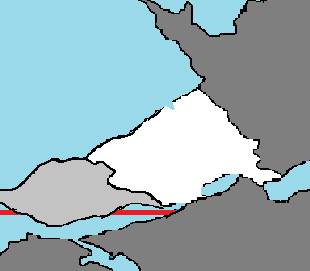Rio Palito: Difference between revisions
No edit summary |
No edit summary |
||
| Line 7: | Line 7: | ||
|national_motto = | |national_motto = | ||
|national_anthem = | |national_anthem = | ||
|image_map = | |image_map = Rio Palito.png | ||
|alt_map = Rio Palito | |alt_map = Rio Palito | ||
|map_caption = | |map_caption = | ||
| Line 92: | Line 92: | ||
}} | }} | ||
The '''Kingdom of Rio Palito''', also known as '''Rio Palitos''', is a small principality in the [[Coalition of Crown Albatross]] governed under a form of constitutional monarchy on the coast of [[ | The '''Kingdom of Rio Palito''', also known as '''Rio Palitos''', is a small principality in the [[Coalition of Crown Albatross]] governed under a form of constitutional monarchy on the coast of [[Euronia]], bordering [[Zamastan]] to the east and south, [[Ruskayn]]'s mainland dependency to the west, and the [[Olympic Ocean]] to the north. Rio Palito's mild climate, scenery, and gambling facilities have contributed to the principality's status as a tourist destination and recreation center for the rich. In more recent years, Rio Palito has become a major banking center and has sought to diversify its economy into the services sector and small, high-value-added, non-polluting industries. The state has no income tax, low business taxes, and is well known for being a tax haven. It is also the host of the annual street circuit motor race Rio Palito Grand Prix, one of the original Grands Prix of [[Crown Formula Racing]]. The capital of [[San Beausoleil]] is one of the most expensive cities on [[Iearth]] to reside in, often dubbed "Billionare's Beach" due to its location on the shore of the Olympic Ocean. | ||
==Etymology== | ==Etymology== | ||
'''Rio Palito''' gets its name from the Quetanan words for "river of sticks"; 'Rio' meaning 'river' and 'Palito' meaning 'little stick'. The historical explanation is that an 12th-century Quetana colonial settlement along a riverbank near modern-day [[San Beausoleil]] was devestated by a flood which breached the shores of the river and washed the settlement and forested areas away, creating a path of destruction and water covered on the surface by wooden debris from destroyed trees and structures. | |||
==History== | ==History== | ||
Revision as of 19:49, 27 April 2020
Kingdom of Rio Palito | |
|---|---|
|
Flag | |
 | |
| Capital | San Beausoleil |
| Official languages | English, Spanish |
| Recognised national languages | Portuguese, French |
| Demonym(s) | Rio Palitan |
| Government | Unitary parliamentary constitutional monarchy |
• Monarch | Maurice Bousieras |
| Émile Flach | |
| Population | |
• Estimate | 13,600,000 |
| HDI (2016) | 0.67 medium |
| Currency | Zamastan ziapet/dollar (ZPT) |
| Date format | mm-dd-yyyy |
| Driving side | right |
| Calling code | +78-87 |
| Internet TLD | .ripa |
The Kingdom of Rio Palito, also known as Rio Palitos, is a small principality in the Coalition of Crown Albatross governed under a form of constitutional monarchy on the coast of Euronia, bordering Zamastan to the east and south, Ruskayn's mainland dependency to the west, and the Olympic Ocean to the north. Rio Palito's mild climate, scenery, and gambling facilities have contributed to the principality's status as a tourist destination and recreation center for the rich. In more recent years, Rio Palito has become a major banking center and has sought to diversify its economy into the services sector and small, high-value-added, non-polluting industries. The state has no income tax, low business taxes, and is well known for being a tax haven. It is also the host of the annual street circuit motor race Rio Palito Grand Prix, one of the original Grands Prix of Crown Formula Racing. The capital of San Beausoleil is one of the most expensive cities on Iearth to reside in, often dubbed "Billionare's Beach" due to its location on the shore of the Olympic Ocean.
Etymology
Rio Palito gets its name from the Quetanan words for "river of sticks"; 'Rio' meaning 'river' and 'Palito' meaning 'little stick'. The historical explanation is that an 12th-century Quetana colonial settlement along a riverbank near modern-day San Beausoleil was devestated by a flood which breached the shores of the river and washed the settlement and forested areas away, creating a path of destruction and water covered on the surface by wooden debris from destroyed trees and structures.
